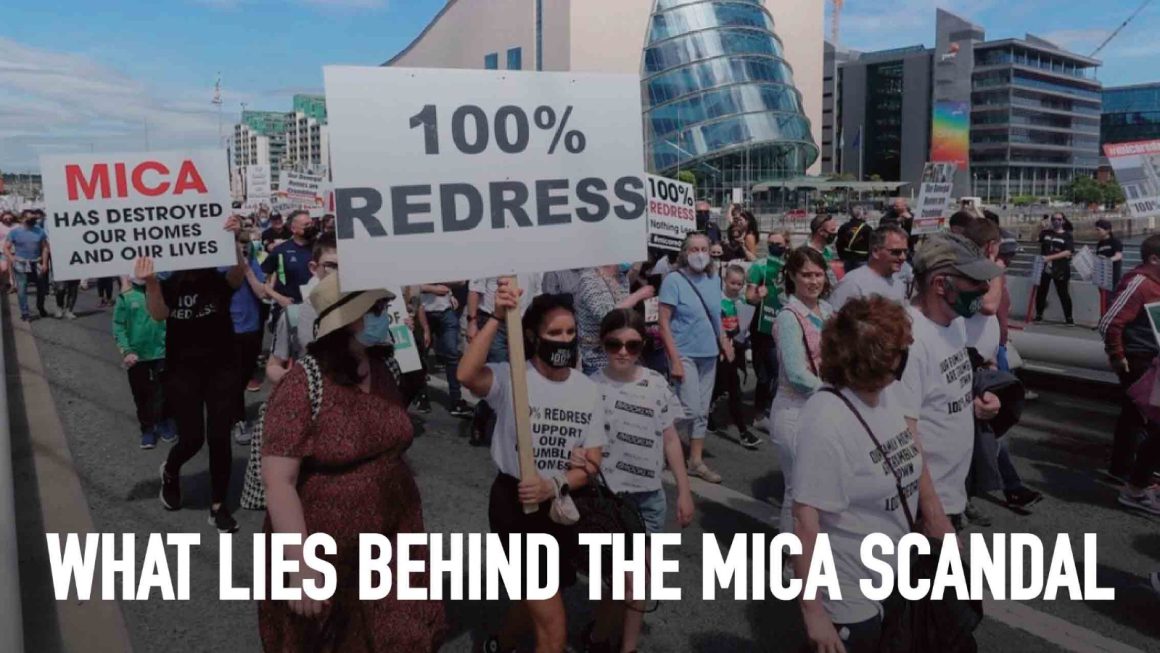By Catherine Finnegan
Thousands of people marched on Dublin’s Convention Centre on 15 June to call for 100% redress for homes affected by the mineral mica. Over 6,000 homes were built throughout the 1990s and early 2000s with defective blocks containing high levels of mica which has resulted in catastrophic cracks and fissures appearing inside and out of people’s homes in Donegal, Mayo, Sligo, and Clare.
The issue is widespread across the North-West, yet the redress scheme is available only in Donegal and Mayo. One group, Clare Pyrite Action Group, was set up to fight for access to the scheme but were left disheartened to hear from activists in Donegal about the issues the latter were still facing. A €6,000 report is required before a house is admitted to the scheme and further cost barriers arise at every turn. Rather than a 100% redress scheme, like that rolled out for homes damaged by pyrite, this scheme only covers up to €247,000 and forces families to pay 10% of the cost, which could be over €20,000. A third of applications to Donegal County Council have had engineers report that the only option for their homes is demolition.
Light touch regulation
This is a serious issue that is causing working people and families to fear for their own homes against the backdrop of a serious housing crisis. In Donegal, one of the companies responsible for the defective blocks, not only still operates but has contracts with Donegal County Council for social housing. This scandal was allowed to happen due to light touch regulation and widespread complicity between government and the construction industry. This is not a thing of the past but still a real and pressing concern.
The stability of people’s homes has been threatened by corner cutting in the name of profit that could have been prevented by robust regulation and oversight. Many eschew regulation as unnecessarily costly, but the right to live in a home with a proper structure must be prioritised, not the interests of profitable construction companies and their wealthy owners. Many already live in homes that are overpriced and are therefore heavily indebted as a result.
Following the mobilisation on 15 June, the government are feeling huge pressure on this issue and have allowed a motion on expanding the redress scheme to pass unchallenged through the Dáil. This pressure should be kept up to ensure the matter is not left there. Housing Minister Darragh O’Brien has warned that the cost of the scheme has already exceeded €1 billion, as if those affected are responsible for the scale of the problem and Leo Varadkar has made comments about potentially limiting the funding of the scheme.
What is needed
The cost of the scheme would not be of any concern if the bill were footed by the building companies responsible, who profited massively from the low-standard houses built at the height of the boom. Scarcity of resources is used time and time again as an excuse for not spending money where it’s needed, but resources is not what is lacking in society. A fit for purpose redress scheme, that is accessible and covers 100% of the costs associated with replacing the defective bricks in any affected home, is essential and should be demanded without delay.
This scandal and the horrendous impact it is having on the lives of those impacted gives us another glimpse of the price we pay for building homes for profit. The major construction companies must be taken out of the hands of profiteers and brought into democratic public ownership. Their resources could then be used to build social and affordable homes in order to end the broader housing crisis that continues unabated.












